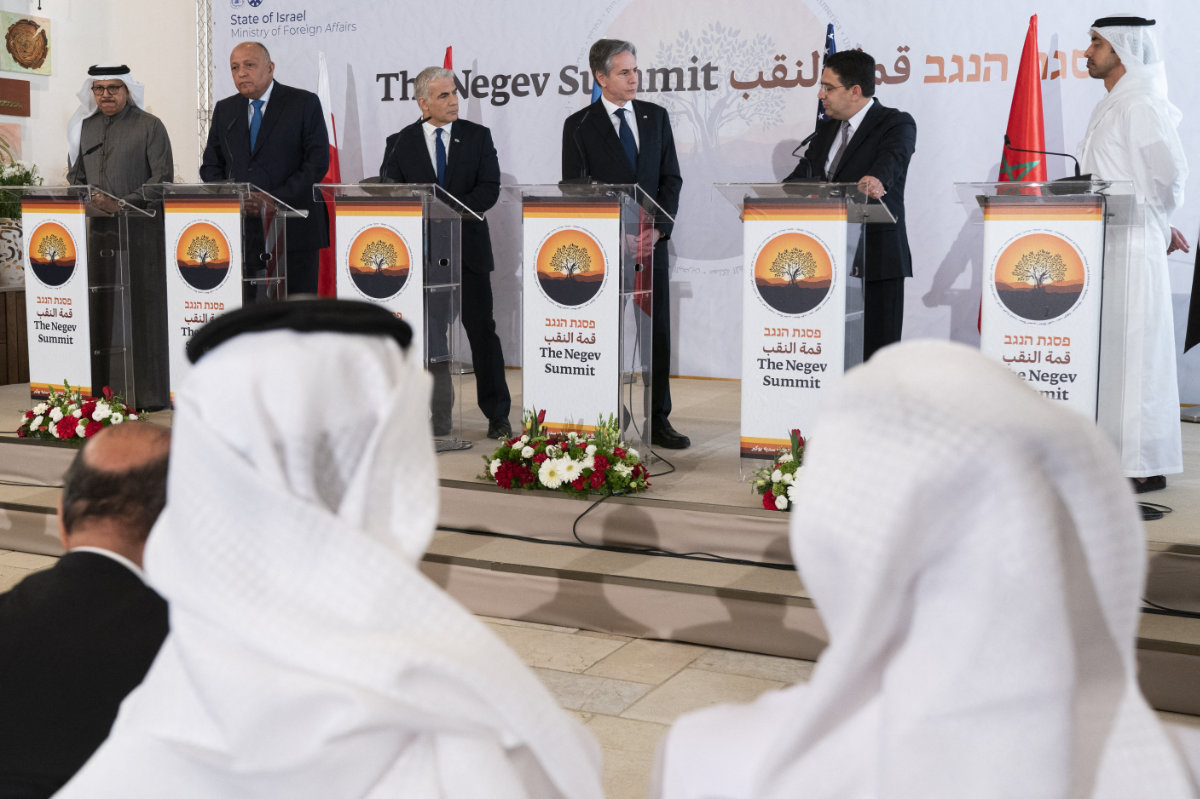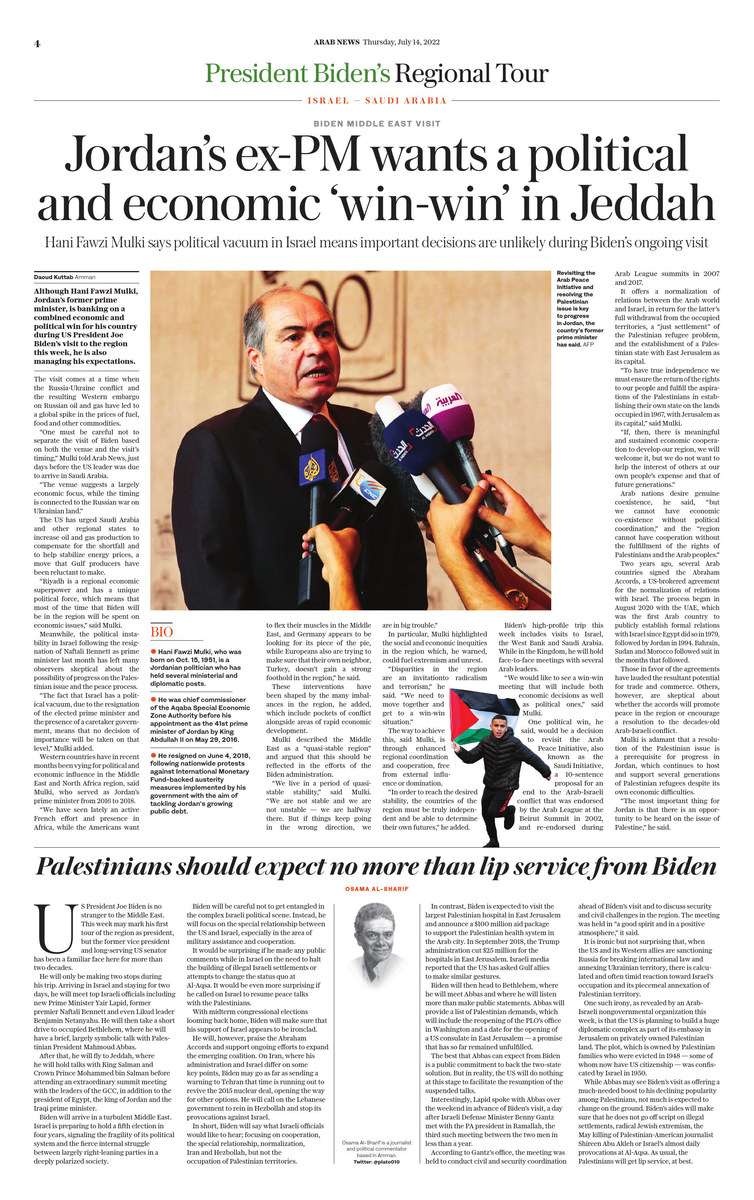AMMAN, Jordan: Although Hani Fawzi Mulki, Jordan’s former prime minister, is banking on a combined economic and political win for his country during US President Joe Biden’s visit to the region this week, he is also managing his expectations.
The visit comes at a time when the Russia-Ukraine conflict and the resulting Western embargo on Russian oil and gas have led to a global spike in the prices of fuel, food and other commodities.
“One must be careful not to separate the visit of Biden based on both the venue and the visit’s timing,” Mulki told Arab News, just days before the US leader was due to arrive in Saudi Arabia.
“The venue suggests a largely economic focus, while the timing is connected to the Russian war on Ukrainian land.”

A gas pump displays the price of fuel at a gas station in McLean, Virginia, on June 10, 2022, as US consumer price inflation surged 9.1 percent over the past 12 months. (AFP file)
The US has urged Saudi Arabia and other regional states to increase oil and gas production to compensate for the shortfall and to help stabilize energy prices, a move that Gulf producers have been reluctant to take.
“Riyadh is a regional economic superpower and has a unique political force, which means that most of the time that Biden will be in the region will be spent on economic issues,” said Mulki.
Meanwhile, the political instability in Israel following the resignation of Naftali Bennett as prime minister last month has left many observers skeptical about the possibility of progress on the Palestinian issue and the peace process.
“The fact that Israel has a political vacuum, due to the resignation of the elected prime minister and the presence of a caretaker government, means that no decision of importance will be taken on that level,” Mulki added.

Palestinians demonstrate against Israeli settler attacks near al-Mughayer village in the occupied West Bank on July 12, 2022. (Abbas Momani / AFP)
Western countries have in recent months been vying for political and economic influence in the Middle East and North Africa region, said Mulki, who served as Jordan’s prime minister from 2016 to 2018.
“We have seen lately an active French effort and presence in Africa, while the Americans want to flex their muscles in the Middle East, and Germany appears to be looking for its piece of the pie, while Europeans also are trying to make sure that their own neighbor, Turkey, doesn’t gain a strong foothold in the region,” he explained.
These interventions have been shaped by the many imbalances in the region, he added, which include pockets of conflict alongside areas of rapid economic development.
BIO
- Hani Fawzi Mulki, who was born on Oct. 15, 1951, is a Jordanian politician and has held several ministerial and diplomatic posts.
- He was chief commissioner of the Aqaba Special Economic Zone Authority before his appointment as the 41st prime minister of Jordan by King Abdullah II on May 29, 2016.
- He resigned on June 4, 2018, following nationwide protests against IMF-backed austerity measures implemented by his government with the aim of tackling Jordan’s growing public debt.
Mulki described the Middle East as a “quasi-stable region” and argued that this should be reflected in the efforts of the Biden administration.
“We live in a period of quasi-stable stability,” said Mulki. “We are not stable and we are not unstable — we are halfway there. But if things keep going in the wrong direction, we are in big trouble.”
In particular he highlighted the social and economic inequities in the region which, he warned, could fuel extremism and unrest.
“Disparities in the region are an invitation to radicalism and terrorism,” he said. “We need to move together and get to a win-win situation.”
The way to achieve this, said Mulki, is is through enhanced regional coordination and cooperation, free from external influence or domination.
“In order to reach the desired stability, the countries of the region must be truly independent and be able to determine their own futures,” he added.

A billboard in the West Bank city of Bethlehem, part of a campaign organized by Israeli rights group B'Tselem, makes a statement on July 13, 2022, during US President Joe Biden's visit. (AFP)
Biden’s high-profile trip this week includes visits to Israel, the West Bank and Saudi Arabia. While in the Kingdom, he will hold face-to-face meetings with several Arab leaders.
“We would like to see a win-win meeting that will include both economic decisions as well as political ones,” said Mulki.
One political win, he said, would be a decision to revisit the Arab Peace Initiative, also known as the Saudi Initiative, a 10-sentence proposal for an end to the Arab-Israeli conflict that was endorsed by the Arab League at the Beirut Summit in 2002, and re-endorsed during Arab League summits in 2007 and 2017.
It offers a normalization of relations between the Arab world and Israel, in return for the latter’s full withdrawal from the occupied territories, a “just settlement” of the Palestinian refugee problem, and the establishment of a Palestinian state with East Jerusalem as its capital.
“To have true independence we must ensure the return of the rights to our people and fulfill the aspirations of the Palestinians in establishing their own state on the lands occupied in 1967, with Jerusalem as its capital,” said Mulki.
“If, then, there is meaningful and sustained economic cooperation to develop our region, we will welcome it but we do not want to help the interest of others at our own people’s expense and that of future generations.”
Arab nations desire genuine coexistence, he said, “but we cannot have economic co-existence without political coordination,” and the “region cannot have cooperation without the fulfillment of the rights of Palestinians and the Arab peoples.”

US Secretary of State Antony Blinken and the foreign ministers of Bahrain, Egypt, Israel, Morocco and the UAE take part in the Negev Summit in Israel on March 28, 2022. (AFP file photo)
Two years ago, several Arab countries signed the Abraham Accords, a US-brokered agreement for the normalization of relations with Israel. The process began in August 2020 with the UAE, which was the first Arab country to publicly establish formal relations with Israel since Egypt did so in 1979, followed by Jordan in 1994. Bahrain, Sudan and Morocco followed suit in the months that followed.
Those in favor of the agreements have lauded the resultant potential for trade and commerce. Others, however, are skeptical about whether the accords will promote peace in the region or encourage a resolution to the decades-old Arab-Israeli conflict.
Mulki is adamant that a resolution of the Palestinian issue is a prerequisite for progress in Jordan, which continues to host and support several generations of Palestinian refugees despite its own economic difficulties.
“The most important thing for Jordan is that there is an opportunity to be heard on the issue of Palestine,” he said. “This is the key to get economic growth while there are tensions, and this is not artificial tension but genuine.
“The area is unstable and will continue to be seen as a quasi-stable region so long as the Palestinian conflict is not resolved peacefully and justly.”

















